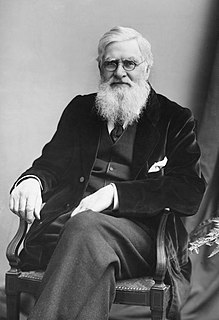A Quote by James Clerk Maxwell
In every branch of knowledge the progress is proportional to the amount of facts on which to build, and therefore to the facility of obtaining data.
Related Quotes
Knowledge signifies things known. Where there are no things known, there is no knowledge. Where there are no things to be known, there can be no knowledge. We have observed that every science, that is, every branch of knowledge, is compounded of certain facts, of which our sensations furnish the evidence. Where no such evidence is supplied, we are without data; we are without first premises; and when, without these, we attempt to build up a science, we do as those who raise edifices without foundations. And what do such builders construct? Castles in the air.
All knowledge that is about human society, and not about the natural world, is historical knowledge, and therefore rests upon judgment and interpretation. This is not to say that facts or data are nonexistent, but that facts get their importance from what is made of them in interpretation… for interpretations depend very much on who the interpreter is, who he or she is addressing, what his or her purpose is, at what historical moment the interpretation takes place.
Each member of society can have only a small fraction of the knowledge possessed by all, and...each is therefore ignorant of most of the facts on which the working of society rests...civilization rests on the fact that we all benefit from knowledge which we do not possess. And one of the ways in which civilization helps us to overcome that limitation on the extent of individual knowledge is by conquering intelligence, not by the acquisition of more knowledge, but by the utilization of knowledge which is and which remains widely dispersed among individuals.
In less than eight years "The Origin of Species" has produced conviction in the minds of a majority of the most eminent living men of science. New facts, new problems, new difficulties as they arise are accepted, solved, or removed by this theory; and its principles are illustrated by the progress and conclusions of every well established branch of human knowledge.
[The scientist] believes passionately in facts, in measured facts. He believes there are no bad facts, that all facts are good facts, though they may be facts about bad things, and his intellectual satisfaction can come only from the acquisition of accurately known facts, from their organization into a body of knowledge, in which the inter-relationship of the measured facts is the dominant consideration.
The impossibility of separating the nomenclature of a science from the science itself, is owing to this, that every branch of physical science must consist of three things; the series of facts which are the objects of the science, the ideas which represent these facts, and the words by which these ideas are expressed. Like three impressions of the same seal, the word ought to produce the idea, and the idea to be a picture of the fact.
The theory of medicine, therefore, presents what is useful in thought, but does not indicate how it is to be applied in practice-the mode of operation of these principles. The theory, when mastered, gives us a certain kind of knowledge. Thus we say, for example, there are three forms of fevers and nine constitutions. The practice of medicine is not the work which the physician carries out, but is that branch of medical knowledge which, when acquired, enables one to form an opinion upon which to base the proper plan of treatment.
It surely can be no offence to state, that the progress of science has led to new views, and that the consequences that can be deduced from the knowledge of a hundred facts may be very different from those deducible from five. It is also possible that the facts first known may be the exceptions to a rule and not the rule itself, and generalisations from these first-known facts, though useful at the time, may be highly mischievous, and impede the progress of the science if retained when it has made some advance.
Although humans have existed on this planet for perhaps 2 million years, the rapid climb to modern civilization within the last 200 years was possible due to the fact that the growth of scientific knowledge is exponential; that is, its rate of expansion is proportional to how much is already known. The more we know, the faster we can know more. For example, we have amassed more knowledge since World War II than all the knowledge amassed in our 2-million-year evolution on this planet. In fact, the amount of knowledge that our scientists gain doubles approximately every 10 to 20 years.



































